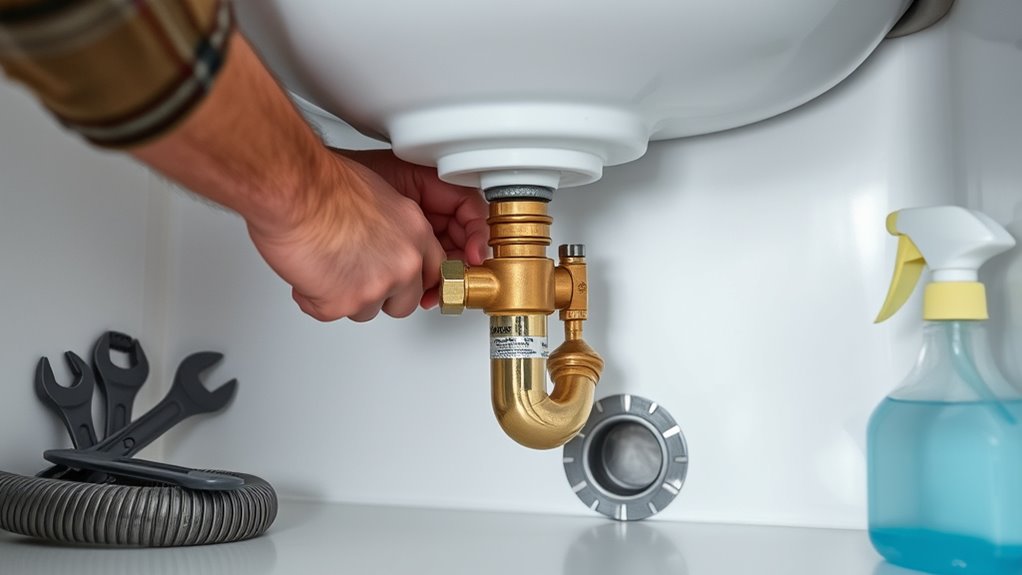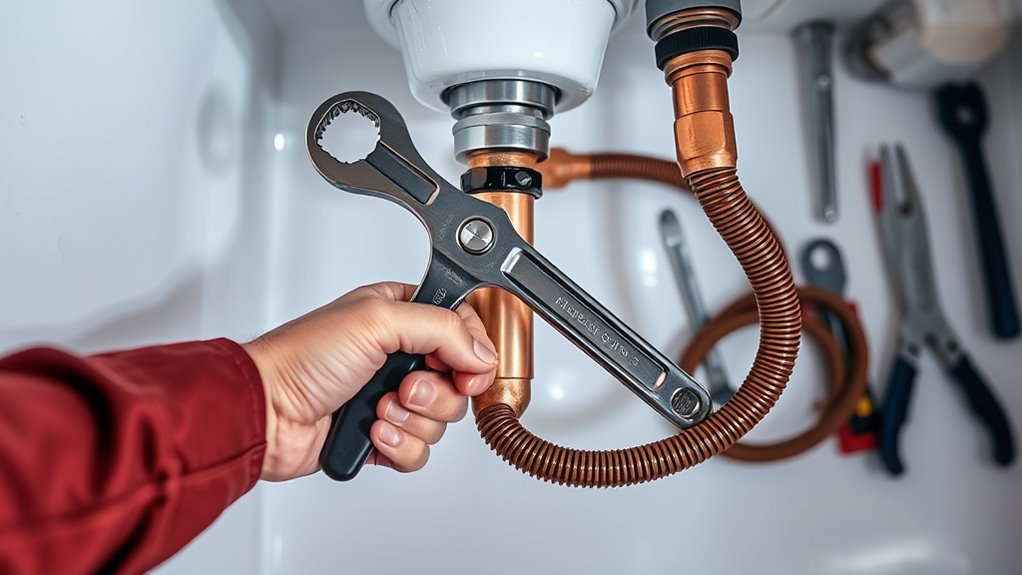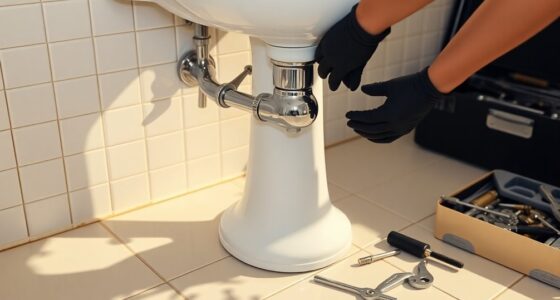To avoid leaks and clogs, regularly inspect your pipes for signs of moisture or corrosion and fix small leaks promptly. Prevent clogs by not pouring grease, hair, or food scraps down drains, and use baking soda and vinegar monthly to keep drains clear. Install a pressure regulator to maintain safe water pressure and flush your water heater annually to prevent sediment buildup. Keep an eye on water pressure and noises—staying proactive helps protect your plumbing system.
Key Takeaways
- Regularly inspect for leaks around fixtures, pipes, and appliances to catch issues early.
- Avoid pouring grease, hair, or food scraps down drains to prevent clogs.
- Use baking soda and vinegar monthly to clear minor buildup and keep drains fresh.
- Install and maintain drain strainers to catch debris and reduce blockages.
- Schedule annual professional plumbing inspections for comprehensive leak and clog prevention.

Regular plumbing maintenance is essential to keep your home running smoothly and prevent costly repairs. One of the most important aspects of this maintenance is caring for your water heater. Proper water heater upkeep ensures efficient operation and extends its lifespan. You should regularly check the temperature settings—ideally around 120°F—to prevent overheating and reduce energy costs. Flushing the tank once a year helps remove sediment buildup that can cause corrosion and reduce efficiency. If you notice inconsistent hot water or strange noises, it might be time to inspect or call a professional for a more thorough assessment. Keeping your water heater in good shape prevents leaks and costly replacements down the line.
Another key component of plumbing maintenance involves understanding drain cleaning methods. Clogged drains are among the most common plumbing issues and can lead to overflowing sinks or backed-up toilets if not addressed promptly. To prevent these problems, avoid pouring grease, hair, or food scraps down the drain. Regularly using a mixture of baking soda and vinegar can help break down minor buildup and keep drains smelling fresh. For tougher clogs, a plunger often does the trick, creating pressure to dislodge debris. If plungers don’t work, drain snakes or augers can reach deeper blockages. Be cautious with chemical drain cleaners—they might be effective, but they can also damage pipes over time. Instead, consider natural methods or professional drain cleaning services if your drains persistently clog. Additionally, staying informed about AI safety developments can help you understand how emerging technologies might influence plumbing and other household systems in the future.
Maintaining your plumbing system isn’t just about quick fixes; it’s about proactive care. Regular inspections can detect small leaks before they become major issues. Check under sinks and around appliances for signs of moisture or corrosion. Fixing leaks early prevents water waste and potential water damage. Keep an eye on your water pressure as well—high pressure can stress pipes and lead to leaks. Installing a pressure regulator can help uphold ideal pressure levels. Additionally, understanding fathers’ influence on family routines and habits can inspire a sense of responsibility in maintenance tasks, ensuring your plumbing remains in top condition.
Frequently Asked Questions
How Often Should I Have a Professional Plumbing Inspection?
You should schedule a professional plumbing inspection every 1 to 2 years to keep your system in top shape. During this visit, a plumber can check for issues like worn pipe insulation and potential leaks. They can also perform drain cleaning to prevent clogs before they become major problems. Regular inspections help you avoid costly repairs and keep your plumbing running smoothly, ensuring your home stays comfortable and efficient.
What Are the Signs of Hidden Plumbing Leaks?
Imagine a silent thief in your home—hidden plumbing leaks can be just as sneaky. Look for signs like unexplained water spots, mold, or a sudden spike in your water bill. Leak detection often requires a thorough pipe inspection, even when no obvious leak is visible. Keep an eye out, because early signs of hidden leaks save you money and prevent major damage down the line.
Can DIY Repairs Cause More Plumbing Issues?
DIY repairs can sometimes cause more plumbing issues because of common pitfalls. If you’re unfamiliar with plumbing systems, you might overlook repair risks like improper fittings or using the wrong materials. These DIY pitfalls can lead to leaks, clogs, or even water damage. Always assess your skill level before attempting repairs—when in doubt, it’s safer to call a professional to avoid costly mistakes and guarantee the job gets done correctly.
What Eco-Friendly Plumbing Maintenance Options Are Available?
You can choose eco-friendly fixtures like low-flow toilets and faucets to reduce water use. Additionally, opt for sustainable pipe materials, such as recycled PVC or copper, to minimize environmental impact. Regularly inspecting your plumbing and avoiding harsh chemicals also helps maintain efficiency and longevity. These eco-conscious practices not only conserve resources but also support a greener lifestyle, making your plumbing system more sustainable and eco-friendly.
How Can I Prevent Sewer Backups in My Home?
To prevent sewer backups, you need to focus on your sewer line. Regularly schedule professional inspections to identify potential issues early. Avoid flushing non-degradable items like wipes and grease, which can clog your pipes. Consider installing a backup prevention device, such as a check valve, to block sewer gases and backups. Properly maintaining your plumbing system helps guarantee smooth flow and reduces the risk of costly backups in your home.
Conclusion
So, there you have it—your foolproof plan to dodge leaks and clogs. Just remember, ignoring a slow drain or dripping faucet is like ignoring a ticking time bomb. Keep up with regular maintenance, and you might just save yourself from a flood of regret—and an even bigger bill. After all, who needs a plumber when you’ve got these tips? Stay vigilant, stay dry, and let your pipes be the envy of all your neighbors!









